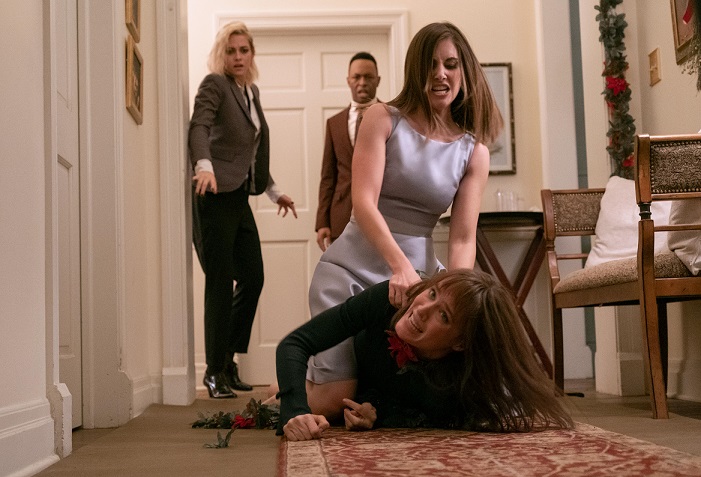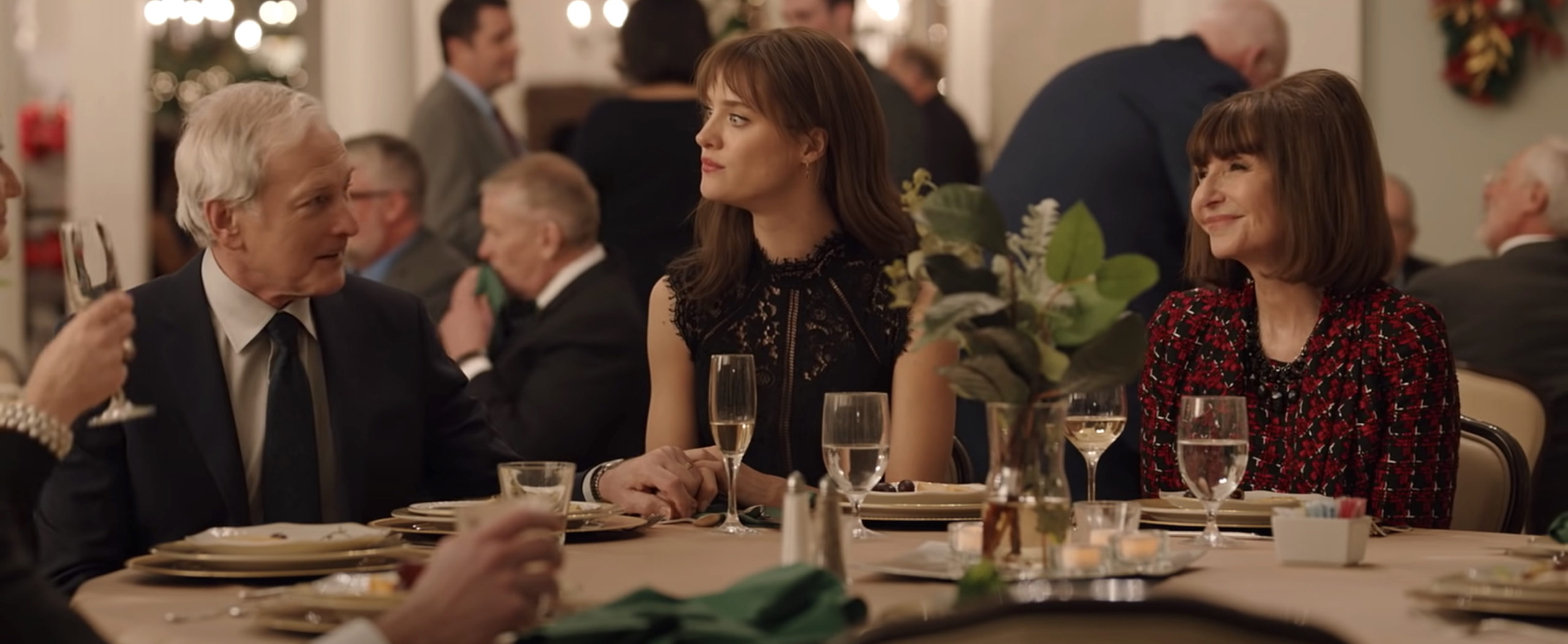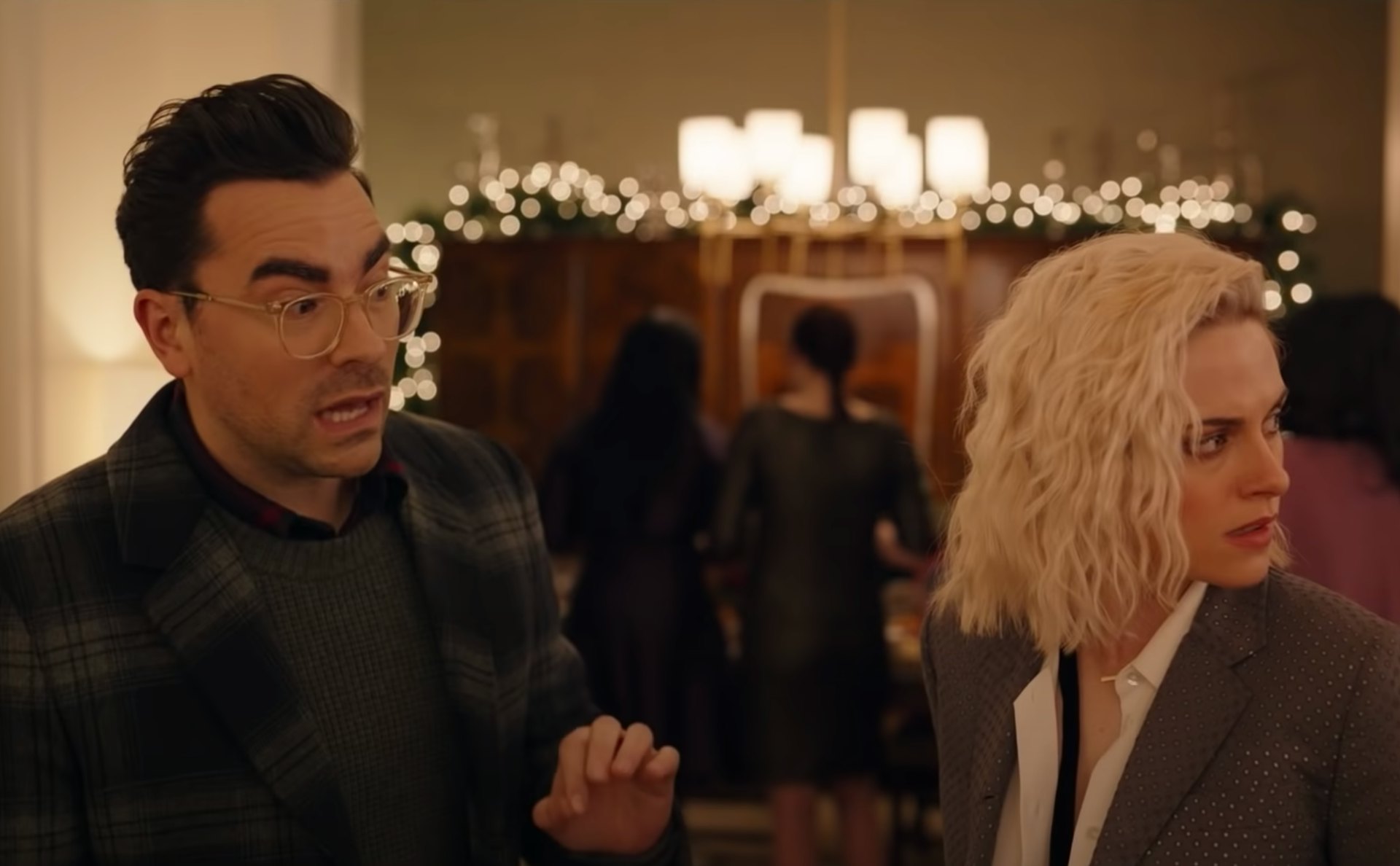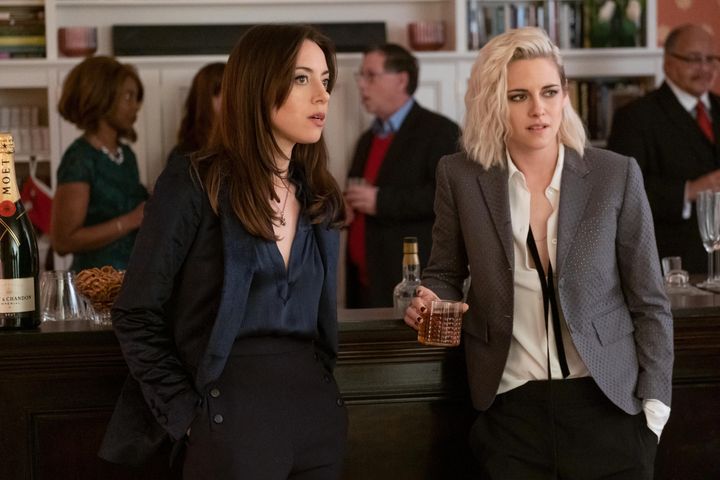I’m a Film Studies and English: Writing major at Winona State University. This semester, I’ll be releasing content for my series “Helpful or Harmful? The Depiction of LGBTQIA+ People in Contemporary Film.” I will be giving my thoughts and critiquing representation of the LGBTQIA+ community in movies today as a member of the community myself. I hope you’ll stick around! I’ll be releasing new content every Friday alternating between written and video film reviews.
WARNING: THIS IS MY ONLY REVIEW THAT CONTAINS SPOILERS
The Happiest Season came out in 2020 and was directed by Clea DuVall. To close out this horrible year, I was very excited to see this movie come out. Positive LGBTQIA+ representation is scarce, especially in Christmas movies. If LGBTQIA+ characters are included in Christmas movies they often fall victim to becoming token characters. To define what a token character is, I’ll refer to an utterly horrible movie called The Kissing Booth that had one of the absolute worst examples I’ve ever seen. I can’t get into how many things are wrong with this movie, but cringing at the tokenization of a gay character in this film is something that I remember clearly. He had no relevance at all, no relationship to the main characters, but they added him right in at the end just so they could have the “diversity.” My point is that the main characters, Abby (Kristen Stewart) and Harper (Mackenzie Davis), were not token characters. They were the MAIN characters and they were gay and in a Christmas movie, which was lesbian representation that I had only dreamed of seeing before. However, this representation didn’t turn out to be quite as positive as I had thought it would be.

The main conflict that Harper is faced with is being part of a family that she fears will not accept her for who she truly is. In the movie, it becomes clear that she and her siblings have had a rough go of it with parents who have impossible expectations and want their three daughters to be “golden children.” This is especially because their father wants to run for mayor and cannot afford a scandal. Harper and her sisters all are faced with conflicts because of this but are given a happy resolution at the end. Harper’s older sister is seeking a divorce from her husband and is liberated when she confesses this to her parents who she knew would not approve. However, in the one year later scenes, we can see that the two of them are trying to make it work and seem to be thriving. Harper’s younger sister is sick of being ignored and unappreciated, and one year later, we see that she is more a part of things. Harper confesses to her parents and in the end, gets the girl, and they end up happily married one year later. It’s clear to see that her prior life experiences trying to be perfect all the time would negatively affect Harper, so we should cut her some slack, right? I think we should—to a point. However, the way that Harper treated Abby in this film, in my opinion, was really, really bad and can’t be excused because of this conflict. Without further ado, let’s get into it.

Right off the bat, Harper very excitedly invites Abby to her parent’s house for Christmas. Abby lost both of her parents and hasn’t been into Christmas ever since they passed, but the thought of meeting Harper’s family makes her so excited, especially because she is planning to propose to Harper. The next morning, Harper is suddenly not so sure that Abby should accompany her but Abby, rightfully, is insistent and excited to meet her girlfriend’s family after being invited to. Once they are already on the way to Harper’s home, she then finally reveals that she lied to Abby when she told her that she came out to her parents, it went well, and they know that she’s dating Abby. Abby, obviously, is very surprised by this and uncomfortable and states that she doesn’t want to go, as Harper asks her to pretend that they are just friends and roommates and nothing more. Harper finally convinces Abby that it won’t be so bad and they continue on with the plan. And so, the whole movie shows how miserable Abby is having to lie and feeling like Harper is hiding her. Harper makes the case that she is hiding herself, and doesn’t mean to hurt Abby’s feelings, but that doesn’t mean that Abby’s feelings are invalid. I think excuses can be made for Harper’s behavior up until a point, but eventually it all just becomes ridiculous.
Harper’s shame also negatively affects Abby. Abby feels that Harper is shameful of her and embarrassed of her. Harper is pushed into talking with her ex boyfriend and seems to like it and puts on a facade that she’s straight which also makes Abby feel bad. They also run into Riley, Harper’s ex-girlfriend who has also been burned by Harper. Are we surprised? Riley also fell victim to Harper’s shame. In high school, one of Harper’s friends found a love letter from Riley in Harper’s locker and Harper denied her relationship with Riley immediately and claimed that Riley was obsessed with her and sent her letters all the time that made her really uncomfortable. Riley becomes Abby’s companion in this movie. Not Harper, Abby’s girlfriend, but Riley was Abby’s companion. Many people, including myself, loved the chemistry that Riley and Abby had and really wanted them to end up together. Why wouldn’t we want Abby to end up with somebody who is kind and not ashamed of her? I think it would have been the perfect ending, but as we know, that is not what happened.
The amount of neglect and abandonment that Harper displays against Abby in this movie is so wild—and not in a good way. It seems that at every function, Harper leaves Abby to the wolves and either goes off with her dad and helps him with his campaign, or she’s reconnecting with her high school friends AND ex boyfriend which makes Abby feel very abandoned and neglected by her girlfriend. Harper barely makes an effort to make Abby feel included. One night, Harper is out with her boyfriend until two in the morning, which already makes Abby uncomfortable. However, like the good girlfriend that she is, the next morning she goes to check on Harper and make sure that she’s okay, especially because Harper wasn’t texting her back. Harper’s response is utterly horrible and this is the point when I knew that I thought Abby deserved better. Harper snapped at Abby, telling her that she felt suffocated by her, and that she needed space.

As I see it, Abby is very unproblematic. She does everything that Harper asks her to, even though it’s painful. Finally, she stands up for herself, and tells Harper that it’s over, twice, but both times, Harper makes her case and declares her love for Abby, and she gets Abby back.
The portrayal of LGBTQIA+ characters in this movie isn’t entirely bad, though. Abby and Riley serve as examples as positive, non toxic LGBTQIA+ characters. Harper’s portrayal is just so bad that it may overshadow that. We also see Dan Levy as a positive LGBTQIA+ character who is Abby’s friend who gives her advice and comes to rescue her in the end. I’m sure if he knew about Riley, he would have advised Abby in that direction.

They handled very emotional subject matter such as Harper’s coming out with comedy in a way that was disorienting, as it went from very high emotion to being very silly very quickly. Harper goes from tackling her sister to coming out to her parents in a few seconds. There were many moments where I laughed out loud. Kristen Stewart’s comedic timing was amazing. Also, Mary Holland as Jane (one of Harper’s sisters) delivered many moments that made me laugh out loud. I was also pleasantly surprised to see Jinkx Monsoon and Ben Da La Creme from RuPaul’s Drag Race featured in this film. Because of this odd balance of comedy and drama, the movie wasn’t as touching as it wanted to be, but a lot of the moments did still manage to strike a chord with me. It’s a film that many LGBTQIA+ people could relate to if they have faced homophobia or confusion—which the vast majority of the LGBTQIA+ community has faced, including myself.
Though this movie was far from perfect, I hope it marks the beginning of what will hopefully be many holiday movies to feature LGBTQIA+ people as more than token characters. It takes on serious struggles faced by members of the LGBTQIA+ community. Though the film didn’t handle all these issues with grace, it’s still very important to try and highlight the discrimination that LGBTQIA+ people face. The film shows us what a toxic relationship looks like, and unfortunately, doesn’t offer the resolution that many watchers were hoping for. Though, it also does show what a happy LGBTQIA+ couple looks like. And there are moments that are bound to make the viewers crack up. It delivers great Christmas vibes. I think it is worth watching at least once.


Recent Comments